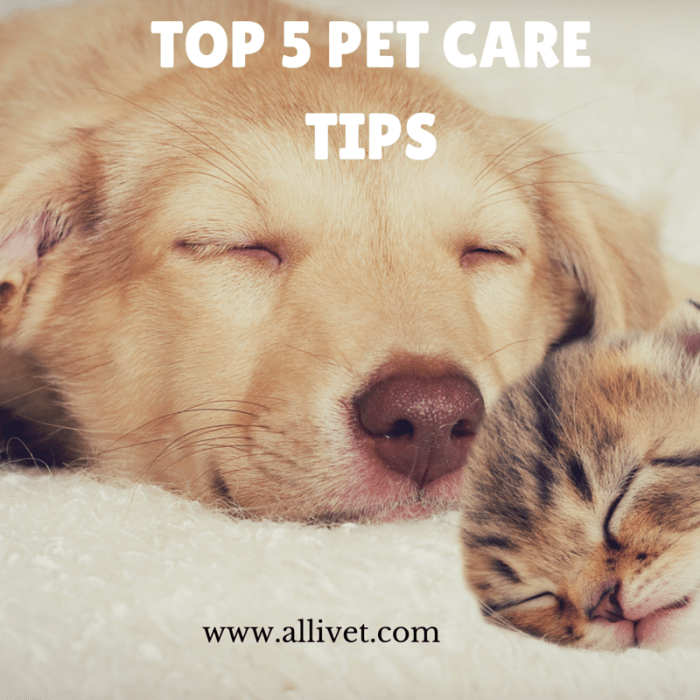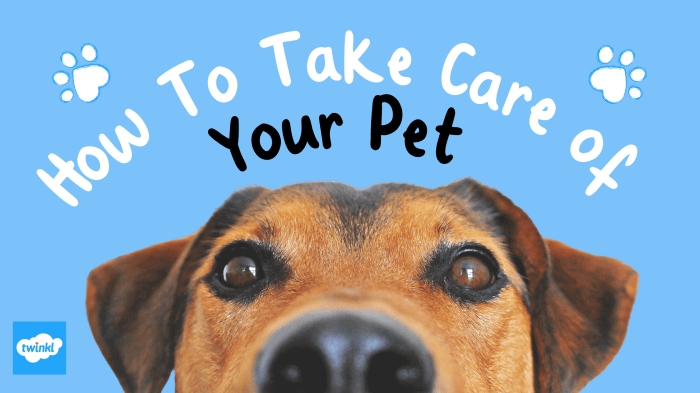Pet care tips set the stage for this enthralling narrative, offering readers a glimpse into a story that is rich in detail and brimming with originality from the outset. From the importance of pet care to the basics of meeting their needs, this guide will ensure your pets are well taken care of in style.
Importance of Pet Care
Pet care is crucial for the well-being of animals as it ensures they receive the necessary attention, love, and support to thrive. Proper care for pets not only helps them stay healthy but also contributes to their overall happiness.
Benefits of Providing Proper Care for Pets
- Regular grooming and hygiene practices can prevent illnesses and infections in pets.
- Proper nutrition and feeding schedules help maintain a pet’s optimal weight and energy levels.
- Exercise and playtime are essential for keeping pets active and mentally stimulated.
- Routine veterinary check-ups and vaccinations can detect health issues early and ensure a pet’s long-term well-being.
How Pet Care Contributes to a Pet’s Overall Health and Happiness
- Creating a safe and comfortable environment for pets reduces stress and anxiety, promoting a sense of security.
- Bonding through regular interaction and training sessions strengthens the relationship between pets and their owners.
- Providing mental stimulation and enrichment activities prevents boredom and behavioral problems in pets.
- Showing love, affection, and attention to pets fosters a sense of companionship and emotional well-being.
Basic Pet Care Needs
Taking care of your furry friend involves meeting their basic needs to ensure they live a healthy and happy life. This includes providing them with proper nutrition, clean water, a safe shelter, regular exercise, grooming, and veterinary care.
Food and Water
- Make sure to feed your pet a balanced diet suitable for their species and age, avoiding any harmful or toxic foods.
- Provide clean and fresh water for your pet at all times to keep them hydrated and healthy.
- Establish a feeding schedule based on your pet’s dietary needs and monitor their weight to prevent obesity or malnutrition.
Shelter and Exercise
- Offer a comfortable and safe shelter for your pet, whether it’s a cozy bed indoors or a secure outdoor space.
- Engage your pet in regular exercise to keep them physically active and mentally stimulated, which can help prevent behavioral issues.
- Ensure your pet has access to a suitable environment that meets their needs, whether they are indoor or outdoor animals.
Grooming Practices
- Regular grooming is essential to maintain your pet’s hygiene and prevent skin issues or matting of fur.
- Brush your pet’s coat regularly, trim their nails when needed, clean their ears, and bathe them with pet-safe products as recommended by your veterinarian.
- Check for any signs of parasites like fleas or ticks during grooming sessions and address them promptly to prevent infestations.
Veterinary Check-Ups
- Regular visits to the veterinarian are crucial for your pet’s overall health and well-being.
- Schedule annual check-ups for vaccinations, parasite prevention, dental care, and early detection of any underlying health issues.
- Consult your veterinarian for specific recommendations based on your pet’s breed, age, and individual needs to ensure they receive the best care possible.
Nutrition and Diet
Proper nutrition is essential for the overall health and well-being of pets. Just like humans, pets require a balanced diet to thrive and stay healthy. A good diet can help prevent various health issues and ensure that your furry friends live a long and happy life.
Importance of a Balanced Diet
A balanced diet for pets should include a mix of proteins, carbohydrates, fats, vitamins, and minerals. Each of these components plays a crucial role in maintaining your pet’s health. Proteins are essential for muscle growth and repair, while carbohydrates provide energy. Fats are important for healthy skin and coat, and vitamins and minerals help support various bodily functions.
Specific Dietary Needs for Different Pets
– Dogs: Dogs are omnivores, which means they can eat a variety of foods. However, their diet should primarily consist of high-quality protein sources, such as meat or fish. They also need carbohydrates for energy and fiber for digestion.
– Cats: Cats are obligate carnivores, meaning they require a diet high in animal protein. They also need taurine, an essential amino acid found in meat, to maintain good vision and heart function.
– Birds: Birds have specific dietary requirements depending on their species. Seed-eating birds need a varied diet of seeds, fruits, and vegetables, while nectar-eating birds require a diet rich in nectar and pollen.
Creating a Healthy Meal Plan
To create a healthy meal plan for your pet, consider their age, size, activity level, and any health conditions they may have. Consult with your veterinarian to determine the right balance of nutrients for your pet’s specific needs. Avoid feeding them table scraps or foods that are toxic to pets, such as chocolate, onions, or grapes. It’s essential to provide fresh water at all times and monitor their weight to ensure they are not under or overweight.
Exercise and Mental Stimulation

Regular exercise and mental stimulation are essential for keeping your pets healthy and happy. Not only does physical activity help maintain their weight and overall well-being, but mental stimulation can prevent boredom and behavioral issues.
Significance of Physical Activity
Regular exercise is crucial for pets to maintain a healthy weight, improve cardiovascular health, and strengthen muscles. It also provides an outlet for their energy, reducing the likelihood of destructive behavior due to boredom or excess energy.
- Take your dog for daily walks or runs to keep them active.
- Engage in interactive play sessions with toys or agility exercises for mental and physical stimulation.
- Consider enrolling your pet in obedience training or agility classes to keep them active and mentally engaged.
Importance of Mental Stimulation
Mental stimulation is just as important as physical exercise for pets. Keeping their minds active can prevent cognitive decline and improve their overall quality of life. Boredom can lead to destructive behaviors like chewing or excessive barking, so it’s crucial to provide mental challenges for your pets.
- Rotate toys regularly to keep your pet engaged and prevent boredom.
- Use puzzle feeders or interactive toys to stimulate your pet’s mind and keep them entertained.
- Practice obedience training and teach new tricks to keep your pet mentally sharp.
Training and Socialization

Training and socialization are crucial aspects of pet care that can greatly enhance the bond between pet and owner. By providing proper training, you can ensure that your pet behaves well in various situations and understands your commands. Socialization, on the other hand, helps pets feel more comfortable around other animals and people, reducing the chances of aggression or fear.
Benefits of Training Pets
Training your pet has numerous benefits, including:
- Improved obedience and behavior
- Enhanced communication between pet and owner
- Increased mental stimulation for the pet
- Strengthened bond and trust
Tips on Socializing Pets
When socializing your pet with other animals and people, consider the following tips:
- Start early and expose your pet to different environments
- Use positive reinforcement to reward good behavior
- Monitor interactions closely and intervene if necessary
- Gradually increase the exposure to new experiences
Addressing Common Behavior Issues
Common behavior issues in pets can be addressed by:
- Identifying the root cause of the behavior
- Consistent training and positive reinforcement
- Seeking professional help if needed
- Creating a predictable routine for the pet
Safety Measures: Pet Care Tips
When it comes to keeping our furry friends safe, pet-proofing our homes is crucial. This involves eliminating potential hazards and creating a secure environment for our pets to thrive.
Pet-Proofing Your Home
- Secure cabinets and drawers that contain cleaning supplies, chemicals, and medications to prevent pets from accessing them.
- Keep electrical cords out of reach or use cord protectors to prevent pets from chewing on them.
- Remove small objects that can be swallowed, such as rubber bands, hair ties, and small children’s toys.
- Use baby gates to block off areas that are off-limits to pets, like staircases or rooms with fragile items.
Common Household Toxins
- Chocolate: Contains substances like theobromine and caffeine that are toxic to dogs and cats.
- Houseplants: Some plants like lilies, poinsettias, and aloe vera can be poisonous to pets if ingested.
- Onions and garlic: These foods can cause damage to red blood cells in dogs and cats.
- Xylitol: An artificial sweetener often found in gum, candy, and toothpaste that is toxic to pets.
Preventing Accidents and Injuries, Pet care tips
- Keep trash cans securely covered to prevent pets from rummaging through and ingesting harmful items.
- Store sharp objects like knives and scissors in locked drawers or high cabinets to avoid accidental injuries.
- Regularly inspect your home for any potential hazards and address them promptly to ensure your pet’s safety.